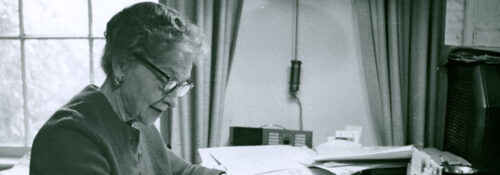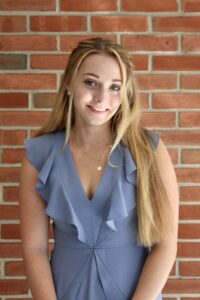
Elizebeth Smith Friedman: Hillsdale Alumna and American Hero
Written by Jessica Kidwell
Juniors Maddy Welsh, Lauren Scott, and their classmates researched the life of codebreaker Elizebeth Smith Friedman, a 1915 Hillsdale College alumna, as their project for the Documentary and Filmmaking class taught by Lecturer in Journalism Buddy Moorehouse. “One of the main goals of our class is to find some great Hillsdale College stories from the past and tell them in a documentary,” Professor Moorehouse said. “It helps people connect with the College and learn about its principles and mission in a truly unique way.”
The class had six weeks to contact sources and research Friedman’s story. They conducted research at the Mitchell Research Center in Hillsdale and rifled through Hillsdale College’s archives, but most of their findings were discovered outside of the “Hillsdale bubble.” Thanks to a generous donation from Thomas and Bonnie Cobb, donors to Hillsdale’s Dow Program in American Journalism, the group traveled across the country to Tucson, Arizona, to interview Elizebeth’s grandson, Chris Atchison, and then to Washington, D.C., and Lexington, Virginia, to visit the George C. Marshall Foundation. Friedman’s books, documents, papers, and even some graded blue-book exams from her time at Hillsdale College reside at the foundation.
The group learned that Friedman was a member of the Michigan Alpha Pi Beta Phi sorority and the Germanae Soldales Society. She was also the literary editor for the Collegian. An English major at Hillsdale, Friedman was passionate about Shakespeare and moved to Chicago to teach elementary school, which consequently led her to her first job in codebreaking. One day, at a Chicago library, the librarian noticed Friedman reading Shakespeare, and connected her with George Fabyan, a wealthy man looking for someone interested in Shakespeare’s writing to work for him at his Riverbank Laboratories. Fabyan recruited Elizebeth to crack the code in his project of proving Shakespeare not to be the true mastermind of his works. While she found no evidence of foul play in her research, she learned methods for encoding messages.
Friedman maintained her relationship with Fabyan, and he offered codebreaking services to the government during World War I. He put Friedman and her husband, William, in charge of the first-ever codebreaking unit in America. During Prohibition, Friedman also helped the United States Coast Guard intercept messages from bootleggers on the Atlantic Ocean, bringing down three mobsters. “She was going against organized crime and some of the most dangerous men in America,” said Lauren.
World War II, however, was her biggest claim to fame, even though she wasn’t recognized for it until her records were declassified in 2008. Her main job was intercepting messages on the Atlantic from German U-boats trying to destroy allied ships. “This was important because it would have jeopardized the English if the supply line were cut off,” Lauren added. “Keeping the line open was vital in World War II, and she was the main person cracking those codes, allowing that to happen.”
Lauren said her favorite thing about this experience was telling a story that should have been told a long time ago. “She definitely is one of America’s greatest heroes,” she said.
“She was who she was from the start, but she developed her strong character and virtue at this college. She developed her love of literature and strong work ethic at Hillsdale College and went off to become an American hero and a person of untouchable character. That is my favorite part of this story—that someone like her started where we are,” Maddy added.
As a journalism student, Maddy learned that creating videos like this documentary is one of the most connective ways to communicate history. “It’s a way to bring someone back to life; this is what the Documentary and Filmmaking class did for Elizebeth,” Maddy said. “We were a part of telling her story, and to be a part of that was a huge honor—and all the more special that she graduated from Hillsdale College,” Lauren concluded.
Moorehouse congratulates the class on the extraordinary job they did telling Friedman’s story. “There’s something so fitting about the fact that six Hillsdale College students were the ones who told the story about another Hillsdale student who helped save the free world,” Moorehouse concluded.
The documentary, “Hillsdale Student, American Hero,” is available on YouTube.
 Jessie Kidwell, ’24, hails from St. Louis, MO, and studies politics. Outside of the classroom, she loves to workout, watch the St. Louis Cardinals, and be with her Pi Phi sisters!
Jessie Kidwell, ’24, hails from St. Louis, MO, and studies politics. Outside of the classroom, she loves to workout, watch the St. Louis Cardinals, and be with her Pi Phi sisters!
Published in February 2023